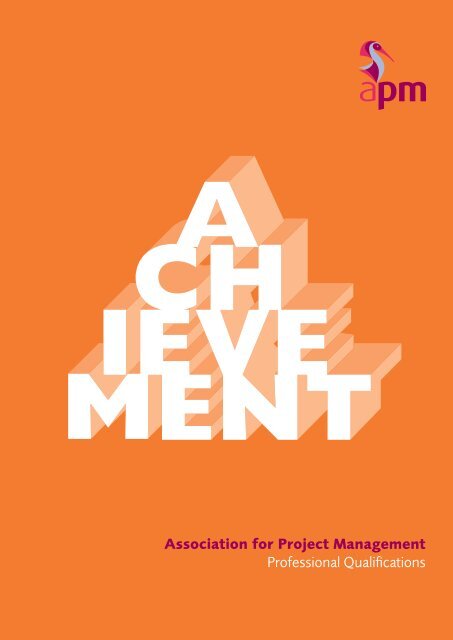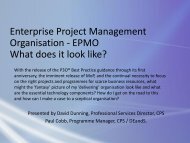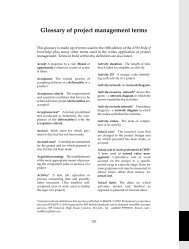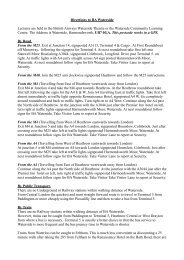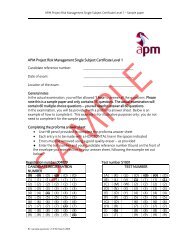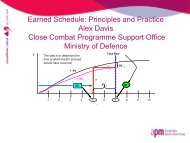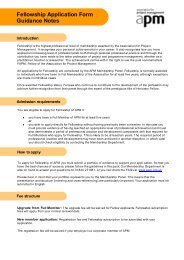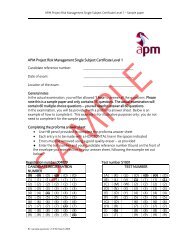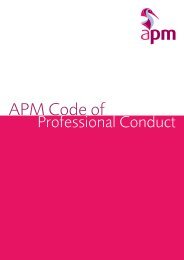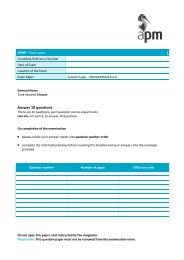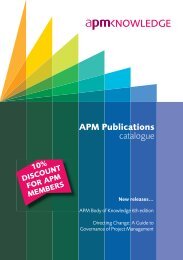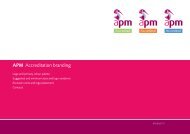Download our qualifications brochure - Association for Project ...
Download our qualifications brochure - Association for Project ...
Download our qualifications brochure - Association for Project ...
Create successful ePaper yourself
Turn your PDF publications into a flip-book with our unique Google optimized e-Paper software.
<strong>Association</strong> <strong>for</strong> <strong>Project</strong> Management<br />
Professional Qualifications
APM adds strength to my working<br />
knowledge of project management.<br />
As a result my career and my<br />
confidence have developed in my<br />
everyday life as a project manager.”
Risk Management Certificates<br />
levels 1 and 2<br />
The <strong>Association</strong> <strong>for</strong> <strong>Project</strong> Management’s<br />
<strong>qualifications</strong> structure reflects and<br />
supports the different stages of learning<br />
you will go through in y<strong>our</strong> project<br />
management career. It develops y<strong>our</strong><br />
knowledge of what project management<br />
is, along with y<strong>our</strong> understanding of how<br />
projects are managed.<br />
Two of the APM <strong>qualifications</strong> are aligned<br />
to the International <strong>Project</strong> Management<br />
<strong>Association</strong> (IPMA) and provide you with<br />
the perfect support <strong>for</strong> y<strong>our</strong> project<br />
professional development. The 3-level<br />
structure benchmarks y<strong>our</strong> j<strong>our</strong>ney from<br />
the first steps of a successful project<br />
management career through to a senior<br />
professional responsible <strong>for</strong> significant<br />
projects and programmes. It steers you<br />
towards the APM Registered <strong>Project</strong><br />
Professional standard, a designation <strong>for</strong><br />
those able to demonstrate the capabilities<br />
of a responsible leader, who can manage a<br />
complex project and use appropriate<br />
tools, processes and techniques.<br />
APM <strong>qualifications</strong> are an essential part of<br />
the APM Five Dimensions of<br />
Professionalism, recognising y<strong>our</strong><br />
achievement and supporting you wherever<br />
you are in y<strong>our</strong> career.<br />
What is the <strong>Project</strong> Risk Management Single<br />
Subject Certificate<br />
The <strong>Project</strong> Risk Management Single Subject Certificate is a<br />
qualification which has two levels. It is designed to build on<br />
the knowledge gained in the APMP qualification or similar<br />
project management <strong>qualifications</strong>.<br />
Who is it <strong>for</strong><br />
Level 1 determines the candidate’s knowledge of the<br />
subject, sufficient to allow them to contribute to risk<br />
management within a project.<br />
Level 2 determines the candidate’s knowledge,<br />
understanding and capability in the subject, sufficient to<br />
allow them to undertake <strong>for</strong>mal project risk management.<br />
What is assessed<br />
The learning outcomes <strong>for</strong> the <strong>qualifications</strong> are detailed<br />
in the APM <strong>Project</strong> Risk Management Certificate syllabus<br />
which broadly covers an understanding of risk principles and<br />
processes, risk identification and response to risk.<br />
Do I have to take Level 1 be<strong>for</strong>e taking<br />
Level 2<br />
No, however, the Level 2 certificate assumes candidates will<br />
have knowledge of the Level 1 syllabus.<br />
How is it assessed<br />
Full details can be found in the candidate guidance notes,<br />
available on <strong>our</strong> website.<br />
Level 1 is a 60 question multiple choice examination that<br />
lasts <strong>for</strong> 1 h<strong>our</strong>.<br />
Level 2 is a 3 h<strong>our</strong> written examination, answering three<br />
questions, one compulsory and two from f<strong>our</strong> optional<br />
questions.<br />
How can I study <strong>for</strong> this qualification<br />
You can study through <strong>our</strong> Accredited Providers or through<br />
self study, using the reference texts detailed in the syllabus<br />
including the APM Body of Knowledge 5th edition and<br />
<strong>Project</strong> Risk Analysis and Management Guide, 2nd edition.<br />
Should you wish to undertake self study you can enter an<br />
open examination run by the APM. Visit <strong>our</strong> website at<br />
www.apm.org.uk/APMQualifications to apply.<br />
Pictured left: Leon Renwick, <strong>Project</strong> Manager at Arup<br />
Programme and <strong>Project</strong> Management, holds the APMP<br />
qualification.
APM Introductory Certificate<br />
in <strong>Project</strong> Management<br />
APMP<br />
What is the Introductory Certificate<br />
The APM Introductory Certificate in <strong>Project</strong> Management<br />
offers a fundamental awareness of project management<br />
terminology <strong>for</strong> those wishing to gain a broad understanding<br />
of the principles of the profession.<br />
Who is it <strong>for</strong><br />
No prior knowledge or experience is required <strong>for</strong> this<br />
qualification which will offer the individual the knowledge to<br />
make a positive contribution to any project.<br />
What is assessed<br />
The Introductory Certificate in <strong>Project</strong> Management assesses<br />
the key elements of the project management lifecycle<br />
and covers 27 knowledge areas from the APM Body of<br />
Knowledge 5th edition including planning and scheduling,<br />
communication, teamwork, res<strong>our</strong>ce management, project<br />
risk management and project reviews.<br />
How is it assessed<br />
Assessment is through a 60 question, multiple choice<br />
examination, taken over 1 h<strong>our</strong>. Please visit <strong>our</strong> website at<br />
www.apm.org.uk/introcert <strong>for</strong> the Introductory Certificate<br />
Candidate Guidance Notes which provide full details of the<br />
examination process.<br />
How can I study <strong>for</strong> this qualification<br />
You can study through APM Accredited Providers who offer<br />
the Introductory Certificate in <strong>Project</strong> Management in many<br />
different <strong>for</strong>mats including classroom, online, CD, public and<br />
in-house c<strong>our</strong>ses. The Introductory Certificate sample paper<br />
will support you in preparing <strong>for</strong> y<strong>our</strong> examination.<br />
You can also self-study; ‘Starting Out in <strong>Project</strong><br />
Management’ is a helpful guide to project management<br />
and a detailed study guide that will support readers wishing<br />
to undertake APM’s Introductory Certificate in <strong>Project</strong><br />
Management. Should you wish to undertake self study,<br />
you can enter an open examination run by APM. Visit<br />
<strong>our</strong> website at www.apm.org.uk/APMQualifications to<br />
download the <strong>qualifications</strong> application <strong>for</strong>m.<br />
What is APMP<br />
APMP (IPMA Level D) is a knowledge-based qualification<br />
that enables candidates to demonstrate knowledge of all<br />
elements of project management. Candidates will be able<br />
to demonstrate an understanding of how these elements<br />
interact and how their project fits into their strategic and<br />
commercial environment. APMP is a qualification recognised<br />
both nationally and internationally giving candidates a<br />
qualification that can be carried from one job to the next or<br />
from one industry to another.<br />
Who is it <strong>for</strong><br />
APMP is aimed at those wishing to achieve a broad level<br />
of project management knowledge so they can participate<br />
in projects from individual assignments through to large<br />
capital projects.<br />
What is assessed<br />
APMP assesses breadth of knowledge in all areas of project<br />
management and covers 37 knowledge areas from the APM<br />
Body of Knowledge 5th edition including budgeting and<br />
cost management, conflict management, communication,<br />
earned value management, leadership, negotiation,<br />
procurement, sponsorship and teamwork.<br />
How is it assessed<br />
There are two examination routes <strong>for</strong> the APMP<br />
qualification:<br />
A three h<strong>our</strong> paper where candidates must answer ten<br />
from sixteen questions covering all 37 syllabus topics.<br />
Or<br />
A fast track route <strong>for</strong> current PRINCE2 ® Registered<br />
Practitioners: a two h<strong>our</strong> paper that recognises prior<br />
learning. In this paper candidates must answer six from<br />
ten questions covering 25 syllabus topics.<br />
Please visit <strong>our</strong> website at www.apm.org.uk/APMP to<br />
download the APMP Guidance Notes which contain full<br />
details of the examination process.<br />
How can I study <strong>for</strong> this qualification<br />
You can study through APM Accredited Providers who<br />
offer the APMP certificate in a number of different <strong>for</strong>mats<br />
including classroom, online, CD, public and in-house<br />
c<strong>our</strong>ses. The APMP sample paper, downloadable from <strong>our</strong><br />
website, will support you in preparing <strong>for</strong> the examination.<br />
If you wish to undertake self-study, you can enter an open<br />
examination run by APM. Visit <strong>our</strong> website at www.apm.org.<br />
uk/APMQualifications to apply.<br />
PRINCE2 ® is a registered trade mark of the Cabinet Office.
APM Practitioner Qualification<br />
What is the Practitioner Qualification (PQ)<br />
The APM Practitioner Qualification (IPMA Level C) is a<br />
competence-based assessment and is recognised<br />
internationally through APM’s membership of the<br />
International <strong>Project</strong> Management <strong>Association</strong> (IPMA).<br />
Who is the Practitioner Qualification <strong>for</strong><br />
The Practitioner Qualification is <strong>for</strong> more experienced<br />
project professionals who can demonstrate an ability to<br />
manage a non-complex project. You should hold the APMP<br />
qualification or demonstrate a good understanding of the<br />
APM Body of Knowledge 5th edition and show relevant<br />
Continuing Professional Development (CPD).<br />
What is assessed<br />
You will be assessed against 30 criteria and must<br />
demonstrate that you can:<br />
understand project context and the overall business case;<br />
effectively apply project management planning;<br />
apply a risk management process competently to the project;<br />
optimise project plans to respond to a major change;<br />
monitor project progress and take suitable controlling action;<br />
plan and conduct a suitable post-project evaluation review;<br />
work effectively as a team member.<br />
How is it assessed<br />
The APM Practitioner Qualification is achieved through a<br />
residential assessment centre focussing on:<br />
Individual work: You will answer written questions based<br />
on a case study including a question on current issues in<br />
project management.<br />
Group work: Working in groups you will be observed<br />
discussing and solving problems related to the case study.<br />
Interview: You will be interviewed <strong>for</strong> 30 minutes by y<strong>our</strong><br />
lead assessor.<br />
How can I prepare <strong>for</strong> the Practitioner<br />
Qualification<br />
The Practitioner Qualification and preparation workshops are<br />
available from <strong>our</strong> Accredited Providers.<br />
Can I become a member of APM after taking<br />
the Practitioner Qualification<br />
Those with the Practitioner Qualification are eligible to become<br />
full members of APM and to use the MAPM post nominals.<br />
APM Registered<br />
<strong>Project</strong> Professional<br />
Looking to take y<strong>our</strong> project management<br />
career beyond PQ<br />
Then you should consider APM Registered <strong>Project</strong><br />
Professional (RPP), the professional standard from the<br />
<strong>Association</strong> <strong>for</strong> <strong>Project</strong> Management.<br />
RPP is a pan sector standard that provides a next<br />
step <strong>for</strong> candidates to take their career beyond<br />
APM Practitioner Qualification. RPP requires you to<br />
demonstrate the capabilities of a responsible leader,<br />
who has the ability to manage a complex project and<br />
use appropriate tools, processes and techniques.<br />
For the first time, it assesses all elements of the APM<br />
5 Dimensions of Professionalism in a single standard,<br />
thereby enhancing professional status and recognition.<br />
It raises the bar of project professionalism to a whole<br />
new level.<br />
Who is it <strong>for</strong><br />
APM Registered <strong>Project</strong> Professional is available<br />
to anyone with experience of managing others in<br />
a complex project environment regardless of their<br />
professional background or <strong>qualifications</strong>.<br />
Why become an APM Registered <strong>Project</strong><br />
Professional<br />
There is a growing recognition of the value that<br />
competent and capable project professionals can<br />
offer. APM Registered <strong>Project</strong> Professional sets project<br />
professionals apart through a robust assessment of<br />
the APM 5 Dimensions of Professionalism. Successful<br />
candidates will be entered onto the APM Register of<br />
<strong>Project</strong> Professionals. The register will demonstrate to<br />
users of project management services and the wider<br />
public those professionals who have met the standard<br />
<strong>for</strong> APM Registered <strong>Project</strong> Professional.<br />
The wider public can be confident that their project<br />
management community has been externally assessed<br />
as competent and dedicated to their own continuing<br />
development. For employers, this visible investment in<br />
staff offers the benefit of raising the profile of project<br />
management as a driver <strong>for</strong> competitive advantage and<br />
improved project delivery.<br />
Visit www.apm.org.uk/rpp <strong>for</strong> more in<strong>for</strong>mation.
<strong>Association</strong> <strong>for</strong> <strong>Project</strong> Management<br />
Ibis House, Regent Park<br />
Summerleys Road<br />
Princes Risborough<br />
Buckinghamshire HP27 9LE<br />
Telephone +44 (0) 845 458 1944<br />
Facsimile +44 (0) 845 458 8807<br />
Email info@apm.org.uk<br />
Web www.apm.org.uk<br />
APM 5 Dimensions of Professionalism<br />
The <strong>Association</strong> <strong>for</strong> <strong>Project</strong> Management supports professional<br />
values. These five dimensions provide a framework that helps<br />
you develop y<strong>our</strong> career.<br />
Breadth<br />
The APM Body of Knowledge defines the knowledge needed<br />
to manage any kind of project. It underpins many project<br />
management standards and methods including the National<br />
Occupational Standard in <strong>Project</strong> Management.<br />
Depth<br />
The APM Competence Framework provides a guide to project<br />
management competences. It is part of y<strong>our</strong> professional<br />
toolkit; mapping levels of knowledge and experience to help<br />
you progress y<strong>our</strong> skills and abilities.<br />
Achievement<br />
APM <strong>qualifications</strong> take y<strong>our</strong> career in new and exciting<br />
directions. They are recognised across the profession and<br />
aligned with IPMA’s 4 level Certification Program.<br />
Commitment<br />
Continuing Professional Development helps develop y<strong>our</strong><br />
project management practice. A targeted development plan<br />
will enhance y<strong>our</strong> project management career.<br />
Accountability<br />
The APM Code of Professional Conduct outlines the ethical<br />
practice expected of a professional. Becoming an APM<br />
member shows y<strong>our</strong> commitment to the code and sets you<br />
apart from others.<br />
BRO 0840911


